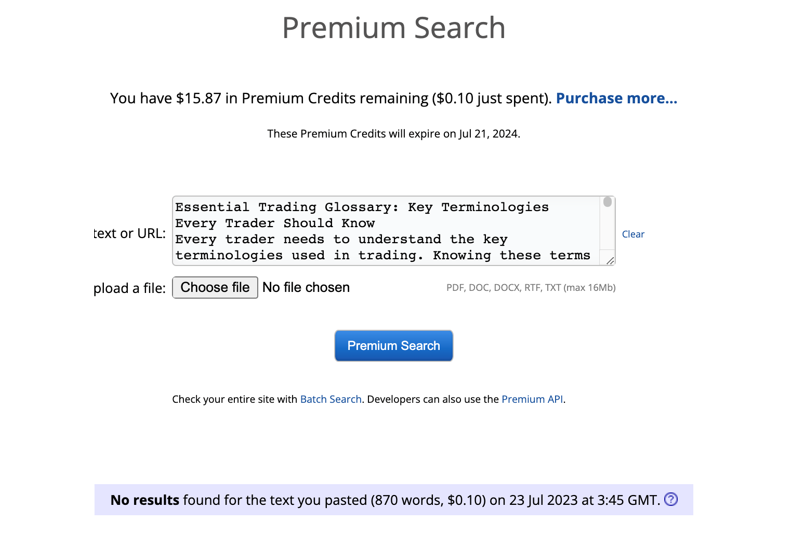Essential Trading Glossary: Key Terminologies Every Trader Should Know
Every trader needs to understand the key terminologies used in trading. Knowing these terms can help traders navigate the fast-paced and unpredictable markets more effectively, make better investment decisions, and, ultimately, increase their chances of success.
This article will provide an extensive glossary of essential trading terminology that every trader should know like the back of their hand. From ” pip” to “market maker,” readers will learn about all the most important concepts they need to comprehend before entering any trade agreement. Get ready to take your knowledge of trading jargon and phrases up a notch.
Arbitrage
Arbitrage, meaning in trading, refers to taking advantage of price differences in different markets for the same asset. Essentially, it involves buying an asset from one market at a lower price and then immediately selling it in another market for a higher price, thus making a profit from the price discrepancy. It is a widely used strategy in trading, particularly in the stock and foreign exchange markets, where prices vary significantly.
While arbitrage opportunities may be rare and short-lived, the profit potential has made it an attractive option for sophisticated traders. However, it requires significant expertise and resources and the ability to act quickly to capitalise on market fluctuations. ADSS has various tools available to help you take advantage of arbitrage opportunities.
PIP
Pip, or percentage in point, is the smallest unit used to measure price movement in the foreign exchange market. It is equal to one-hundredth of a per cent and is typically used when quoting currency pairs. For example, if the euro/dollar pair moves from 1.3000 to 1.3010, then this would be considered a 10-pip move up.
Understanding how pips are calculated can help traders accurately determine their potential profits and losses on trades. PIPs also serve as the basis for calculating most Forex trading costs, such as spreads and commissions offered by brokers.
Market maker
A market maker is an individual or institution that provides liquidity to a market by quoting buy and sell orders in security. Market makers are typically brokers or dealers who offer two-sided quotes to facilitate trading between buyers and sellers. They may also provide other services, such as providing liquidity to the market, setting bid/ask spreads, and collecting commissions from traders.
Market makers are essential in providing efficient markets by maintaining continuous liquidity and ensuring fairness for all participants. By helping increase competition for trades, they can help reduce transaction costs, ultimately benefiting investors.
Day Trading
Day trading is a type of short-term trading style that involves entering and exiting positions within the same day. It differs from traditional buy-and-hold investing, as traders only hold onto their positions for a short period. Instead, they look to quickly take advantage of small intraday price movements to potentially make a return.
This strategy requires traders to be constantly alert and active as markets continuously change. Day traders must have quick reflexes and excellent analytical skills to identify advantageous trades and execute them without hesitation. Day trading can be risky, but careful research and discipline can yield substantial rewards if done correctly.
Equity
In trading terms, equity means ownership or value. Specifically, it refers to the portion of a company’s assets that shareholders own after subtracting liabilities. It can also refer to an individual investor’s portfolio of investments and cash balance combined.
Understanding how equity works is essential for traders as it can help them decide when to buy or sell stocks and other securities. Equity can also be used as collateral for margin loans, allowing investors to increase their buying power and potentially generate more significant returns from their trades. Remember, if the value of your investment position declines, you could lose more money than what you initially invested.
Fill or Kill Order (FOK)
A fill or kill order, also known as a FOK order, is a type of trading order that requires immediate execution at a specified price. If the order cannot be completed within a specific period, it is automatically cancelled. This type of order is typically used by traders who want to ensure they get the best possible price for their trades and are willing to pay higher commissions or fees for greater certainty.
In addition to providing guaranteed prices, FOK orders can also help traders limit risks from sudden market fluctuations. As such, it is essential to carefully consider how this type of order may impact your trading strategy and weigh the associated costs against potential benefits before placing one.
Hedging
Hedging in trading is a risk management strategy that involves offsetting or reducing potential losses from an investment. It is typically done by taking out an opposite position in a related asset, such as buying stocks, while selling futures contracts with the same expiration date.
In this way, traders can protect themselves from unexpected market movements and limit their losses if the prices of their investments start to decline. Hedging can also be used to take advantage of price discrepancies between markets or take advantage of arbitrage opportunities. In any case, traders need to understand the risks associated with hedging and seek professional advice when necessary.


